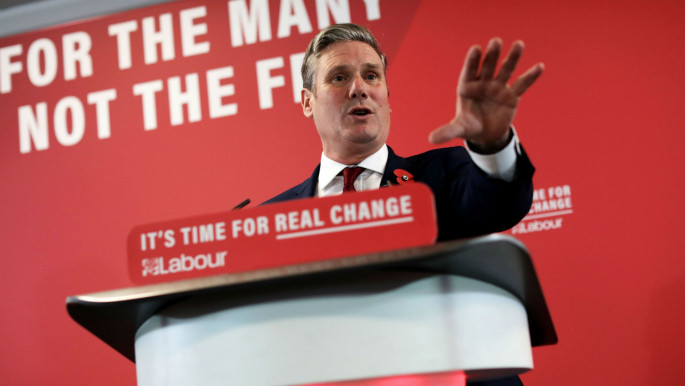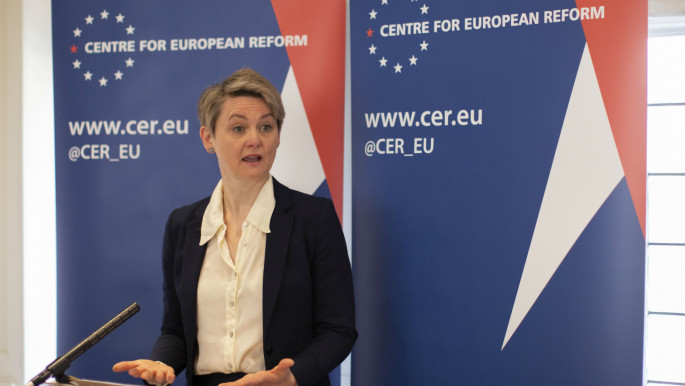The 2020 Labour Party leadership contender guide
The result of the election could determine the future of the Labour party – who will hold Prime Minister Boris Johnson to account at the ballot box and who will lead the party into a general election in 2025.
So who will be running? And where do they stand on issues such as foreign policy, racism and Brexit?
Rebecca Long-Bailey
Rebecca Long-Bailey, Shadow Business Secretary, is backed by Angela Rayner, who was rumoured to be another front runner, before she threw her support behind her friend.
Bailey is known as the continuity Corbyn candidate and although she has been somewhat quiet on foreign policy issues, many will associate her with Corbyn's stances.
Supporters view Corbyn's Labour views as anti-imperialist and internationalist, while detractors view it as neo-Stalinist, with accusations of failing to adequately condemn regimes which are perceived to have antagonistic relations with the West and Israel.
Bailey met with the Jewish Labour Movement in order to address the anti-Semitism crisis in Labour, condemning controversial outlet The Canary and MP Chris Williamson who was suspended for anti-Semitism.
However Bailey has also defended Corbyn against such accusations, for example, when he wrote a forward in a book by John Atkinson's Hobson which contained anti-Semitic tropes.
Bailey voted against military intervention in Syria in 2015 tweeting that she was not satisfied that the drafted proposals will ensure long term security in the UK and Syria.
Although Bailey will gain support on the left of the party – and is said to currently be the front runner – there may also be concerns over her electability following Corbyn's disastrous loss.
Ian Lavery
Lavery is another 'continuity Corbyn' candidate who will be viewed as being even closer to the leader than Bailey. He will therefore be associated with the world view of Corbynism, as described above.
Twitter Post
|
He voted against Syria strikes, but voted in favour of a No Fly Zone over Libya. Lavery is also a member of the Labour Friends of Palestine and the Middle East.
Although many were hoping for a woman or member of the BAME community for leader, the most loyal Corbynite core may back Lavery.
Some may hope that Lavery may attract the "traditional working class vote", a sentiment which has been criticised for usually alluding to white men with regional accents and socially conservative politics.
Lavery is praised for being close to the unions. In fact, he is so close he is alleged to have received £165,000 from a small union, although this was never properly investigated.
Emily Thornberry
Emily Thornberry, the Shadow Foreign Secretary, drew the ire of the Syrian community and solidarity activists when she described reports of regime chemical weapons attacks in Idlib, north Syria, as potentially coming from "proscribed terrorist groups".
In 2017, she advocated giving Syrian President Bashar al-Assad 'full control' of Syria, and pledged reconstruction funds. Despite being engaged in a civil war against his own people, Thornberry said that popular support for Assad had been "underestimated".
Thornberry is part of Labour Friends for Israel, and has also pressed the government on the situation in Gaza, calling for an independent investigation over Palestinian protester's deaths during the border protests in 2018.
Thornberry is close to Corbyn, however she distanced herself from the party's Brexit policy following the 2019 EU elections where the party is thought to have lost out on votes to the small pro-Remain centrist party, the Liberal Democrats.
Jess Phillips
Jess Phillips is the most openly Corbyn-sceptic contender for the leadership, having openly criticised the left of the party for its failure to come to a stance on Brexit, and for their alleged misogyny. This has lead to constant attacks on Phillips from the party's left.
Phillips constantly called out anti-Semitism within the Labour party, however has also been criticised for commenting on women's roles in British Muslim communities when she said: "Well, sorry, the British Pakistani-Bangladeshi community, certainly where I am, has issues about women's roles in a family, in society... That's the truth. Not all of them, obviously. But I have lots of cases on my books."
She wrestled with the vote over military intervention in Syria in 2015 and eventually voted against it, saying she would "live with" her decision, rather than revel in it.
Twitter Post
|
Phillips is a member of Labour Friends of Israel and has also visited the occupied Palestinian territories with Medical Aid for Palestinians, where she called on the UK government to help ensure Palestinians had access to medical care.
Phillips is popular within the most Corbyn critical parts of the Labour movement. However, considering that many such dissenters are thought to be among those who have left the party in recent years, that is unlikely to bring her enough votes from within the party membership.
Lisa Nandy
Nandy is chair for Labour Friends of Palestine. She called for Labour to make a "progressive case for a peaceful two-state solution in Palestine and Israel," and supported "initiatives of Israeli and Palestinian citizens to achieve peace and reconciliation."
She backed a refugee family reunion bill, which would have made it easier for refugee children in the UK to obtain visas for their family.
It is also worth noting that Nandy was one of a handful of Labour MPs to engage with Theresa May in searching for a Brexit compromise. This may either work in favour for her, as many thought the party's eventual support for a people's vote was a mistake. On the other hand, this may dissuade the remain-majority membership from voting for her.
She declined to vote for intervention in Syria writing at the time: "I am not a pacifist. I am proud of the role our armed forces have played in Sierra Leone, Kosovo and other conflicts around the world... But as Wigan’s MP, my first responsibility is to my constituents, and to the servicemen and women from Wigan who will take part in conflict.
"I am not convinced the plan the Prime Minister has put forward thus far will make us safer or reduce the threat of ISIL Daesh (the Islamic State group)."
Clive Lewis
Lewis is on the left of the party, but has had disagreements with the Corbyn wing of Labour over nuclear weapons and Brexit.
He opposed military intervention in Syria, saying: "Let’s go for the diplomatic options first and exhaust them rather than this knee-jerk reaction that we see in this House time after time, which is 'we’ve got a problem in the Middle East, bomb it’," he said at the time.
Lewis also spoke out on anti-Semitism in the Labour party, while also supporting Palestinian rights.
"Denunciations of Israel that cross the line into anti-Semitism do the Palestinians no favours," he wrote. "We can campaign more openly for our policy for peace between Israel and the Palestinians: for an independent state of Palestine alongside Israel."
Lewis supported a "left" case for remaining in the EU, and the left leaning membership who became frustrated with Corbyn's reluctance to make the case for a second referendum may be drawn to him.
Keir Starmer
Starmer is known as one of the more centrist candidates, although his loyalty to Corbyn while serving as Shadow Brexit Secretary, as well as his eloquence, perceived electability may still gain him votes from the Corbynite membership.
A self-selected Labour poll pointed to him being the top choice among members, while a poll of the public suggested he might be voters' first choices. Although his election may disappoint those who were hoping to see Labour's first woman leader.
On Syria, he voted against military action in 2015, but wrote an article supporting intervention in principle, saying that, unlike the war in Iraq, such intervention would be "lawful" but he thought they would not be adequate without ground strikes.
He is often described as a key figure in pushing the Labour party towards a more remain stance.
Yvette Cooper

Cooper is another centrist candidate, however out of the candidates she is likely the most associated with New Labour, serving in the cabinets of both former Prime Minsters' Gordon Brown and Tony Blair.
She is a competent politician, grilling former PM Theresa May over her Brexit plan, and lead back-bench efforts to stop a No Deal Brexit. There were rumours she could team up with Phillips as deputy, which would be a dream for centrists, but a worst nightmare for the party's left.
Along with Scottish Nationalist Party leader Nicola Sturgeon, Cooper offered to personally house Syrian refugees. She wanted 10,000 more Syrian refugees welcomed in the UK.
When critiqued for not going through with her offer some time later, she said that the government were not permitting many refugee families to enter the UK.
Cooper has generally supported interventions in the Middle East, voting for the Iraq war, 2011 intervention in Libya and intervention in Syria in 2013 and 2015.
She was a competitor of Corbyn for the leadership in 2015, gaining 19 percent of the vote.
David Lammy
Like Starmer, Lammy maybe able to attract votes from the left and right of Labour. Previously close to the ideology of New Labour, he turned to the left during Corbyn's tenure. However he has diverged from the leadership by being an outspoken advocate of staying in the EU and giving memorable speeches during commons debates on Brexit motions.
He is a strong advocate of minority rights and a scathing critic of former PM Theresa May's 'hostile environment' for immigrants, with part of his commons speeches being sampled by grime artist Stormzy.
Lammy, a London native, was also scathing in his criticism towards the government's reaction towards the Grenfell disaster.
Twitter Post
|
Lammy voted against Syria intervention in 2015, saying that it would create "new extremists". He is also a member of Labour Friends for Palestine, and joined other MPs in condemning the violence on the Gaza border in 2018.
Imogen Lambert is a staff journalist at The New Arab
Follow us on Twitter and Instagram to stay connected





 Follow the Middle East's top stories in English at The New Arab on Google News
Follow the Middle East's top stories in English at The New Arab on Google News


